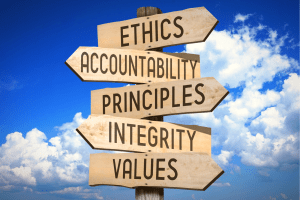Culture can be difficult to define, but it embodies who we are as a company.
 Welcome to another episode of Clear Talk. Today, our CEO, Brad Dempsey, is joined by Brad Malone from Navigate Management Consulting, to discuss how culture is the soul of your integration company.
Welcome to another episode of Clear Talk. Today, our CEO, Brad Dempsey, is joined by Brad Malone from Navigate Management Consulting, to discuss how culture is the soul of your integration company.
If you take a fish out of water, culture is the water it didn’t know it was swimming in – and it is the water that we are all swimming in when we’re in a company.
It’s important to note that our customers are the ones who really see our culture.
So, if there’s inconsistency in our employees’ values, the way they treat the customers, and the way they feel about the customers, that permeates throughout our entire integration business.
How do our employees know what our values are?
Integrators should talk about what it means to be ‘living your values’ on a regular basis. It’s important to discuss examples of ethics, and what you consider to be your core values as a company.
“We always need to lead by example and live our values,” says Dempsey. “We regularly speak with individuals, about how we feel about our customers. We firmly believe our tagline, that we want to become our customers’ most valued business partner. And you can’t do that if you’ve got unhappy employees. You can’t do that if you have employees who don’t feel compassion and empathy for your customers – and that can’t be faked.”
What happens when responsibility and accountability are out of balance?
Accountability starts at the top, and if somebody has authority, they should also have responsibility.
“I find that in organizations that have an unhealthy culture, it’s when the executives aren’t looking in the mirror very much,” says Malone. “You need to hold yourself personally responsible, have integrity and walk the talk.”
“It has been my experience that when you don’t have the courage to manage to your culture, you tend to have 30-, 40-, and 50-year-old children, who are not taking personal responsibility,” says Malone. “They’re finding excuses and it’s like, ‘Come on. Are you 5 or are you 50?’ And if you think you’re the most special person in a company, that’s a child.”
“Being an adult doesn’t mean that we have no passion, it’s just that we have cognitive thought, we’re rational, and we can act with intention. Integrators with the most visible culture are typically a bunch of adults, taking personal responsibility, and it’s refreshing,” concludes Malone.
Also on the podcast:
-
What are the costs of hypocrisy and inconsistency?
-
What are the benefits of a healthy culture?
Watch the video for all this and much more!
Are You Living Your Values and Ethics, and How Can You Tell?
Handpicked Related Content
-
Basic behavior is either the willful alignment to established standards, or the willful disobedience of those standards. In last week’s blog, we discussed the importance of distinguishing competence from behavior to maximize performance improvement. Today, we continue this conversation. Behavior…
-
by Brad Malone, MA, PMP We’ve all heard how different generations of people (baby boomers, Gen X, Gen Y) work and live differently. This sometimes causes frustration for those of one generation who must interact with those of another generation…



